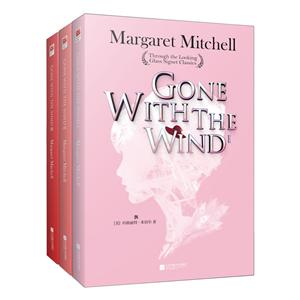-
>
西班牙语词根宝典
-
>
英语大书虫世界经典名译典藏书系:中国人的精神 (英汉对照)(精选权威版本)
-
>
许渊冲译唐诗三百首:汉文·英语
-
>
四级词汇词根+联想记忆法:乱序版
-
>
The secret garden
-
>
英国文学名篇选注
-
>
许渊冲译千家诗
飘(英文版)GONE WITH THE WIND 版权信息
- ISBN:9787559421630
- 条形码:9787559421630 ; 978-7-5594-2163-0
- 装帧:一般纯质纸
- 册数:暂无
- 重量:暂无
- 所属分类:>>
飘(英文版)GONE WITH THE WIND 本书特色
编辑推荐 米切尔一生只写了一部名作,却轰动了世界 获得普利策奖和纽约南方协会金质奖章 Tomorrow is another day. 人们无法避开生活带来的痛苦,却可拍一拍身上的土,起身紧一紧拳头,笑着说一句:“明天将是新的一天。” 她从未真正理解过她所爱的那两个男人中的任何一个,所以她把两个人都失去了。 以史诗般的宏阔,凝住了南北战争那段风雨飘摇的历史 描绘了一个女子的心路历程 将那段迷雾中绽放的爱情描绘得如斯动人 卖点 ◎世界十大名著之一 美国出版行业的畅销传奇 《飘》初问世,打破了当时的所有出版纪录。前六个月它的发行量便高达1000万册,日销售量zuigao达到5万册。它标价3美元,却被炒到了60美元,而当时美国一处不错的旅馆,月租金也不过30美元。当时,人们争相一睹玛格丽特·米切尔的芳容,她所到之处,迎接她的人群甚至比迎接罗斯福总统的还要多。 ◎“一个女性的成长史,以史诗般的宏阔,凝住了南北战争那段风雨飘摇的历史” 作品中处处流露出的温厚的女性主义光辉,也是玛格丽特所独有的。她的外祖母曾是亚特兰大zui为激进的妇女组织的主席,常常站在公众场合的凳子上,用传教士布道式的口吻高声谴责着社会对女性的不公。玛格丽特受其影响颇深,却未如此激进。她用一种缓缓的,却坚定的方式诉说着女性的独特力量。 玛格丽特不曾大肆批驳老旧的陈词滥调,只用一个个坚韧独立的女性剪影,描画出一个个战争中还能挺起胸膛的南方淑女。当读到郝思嘉站在十二橡树庄园的废墟中,对着残阳发狠念出的誓言时,不禁令人心生感动。 ◎《世界文学史》&《纽约时报》鼎力推荐的传奇作品 作品荣获普利策奖、国出版商协会奖和纽约南方协会金盾奖牌;被《纽约时报》和美国《读者文摘》组织的横跨欧、亚、美、澳、非五大洲百城十万读者的投票调查,精选为十部经典长篇名著之一!同时被誉为21世纪现代女性必读的人生四书之一。 ◎随书附赠“英英中”单词小册子,精美装帧,值得收藏 精装双封面设计,三个封面颜色与斯嘉丽的性格成长息息相关,让人体会到从一个天真单纯甚至有些自私的女孩子,成长为一肩力挑塔拉种植园和整个家庭重担的顶梁柱。且随书附赠“英英中”单词小册子,英文直译更便于读者提高自己的阅读能力。 ◎同名电影至今仍经久不衰,深受广大影迷喜爱 据此书拍成的电影于1939年12月15日在亚特兰大举行首映,引起轰动,并迅速风靡全球。而扮演男女主角的演员克拉克·盖博和费雯·丽更是因此而留在了许多影迷的心中。
飘(英文版)GONE WITH THE WIND 内容简介
美国南北战争前夕,南方农场塔拉种植园的千金斯嘉丽在得知自己一直爱慕的另一个农场主的儿子阿什利将要娶妻,于是勇敢向他示爱,遭到拒绝,为了报复,她嫁给了自己不爱的男人——阿什利妻子梅兰妮的弟弟查尔斯。? 战争期间,斯嘉丽成为寡妇,生下幼子,在经历亚特兰大的城破被焚之日后,她带着刚生产完毕、身体虚弱的梅兰妮回到了塔拉,本以为是回到温馨的家,不想面前景象一派残破——母亲去世,父亲深受打击失智,两个妹妹也在死亡的边缘徘徊,棉花被毁——她挑起生活的重担,不再是当初的千金小姐。战争结束后,她为了种植园不落入他人之手,四处觅钱,甚至不惜抢了自己妹妹的未婚夫。同时,她为了撑死亚特兰大的小家,更为了塔拉的大家,她不得不在怀孕期间仍撑着办理锯木厂,却遭受他人口实。而在第二任丈夫被枪杀之后,她又再度为人妻,嫁给了爱她多年的投机商人瑞德。? 然而,纵使经历了生活的艰苦,斯嘉丽对阿什利的感情仍然没有改变。阿什利妻子梅兰妮的去世,给了斯嘉丽一个机会,一边是深爱自己的丈夫瑞德,一边是心心念念多年的阿什利?斯嘉丽会给自己怎样一个不一样的明天?
飘(英文版)GONE WITH THE WIND 目录
001 / Part One
136 / Part Two
284 / Part Three
519 / Part Four
861 / Part Five
飘(英文版)GONE WITH THE WIND 节选
【试读】 Gone With The Wind Part One Chapter 1 Scarlett O’Hara was not beautiful, but men seldom realized it when caught by her charm as the Tarleton twins were. In her face were too sharply blended the delicate features of her mother, a Coast aristocrat of French descent, and the heavy ones of her florid Irish father. But it was an arresting face, pointed of chin, square of jaw. Her eyes were pale green without a touch of hazel, starred with bristly black lashes and slightly tilted at the ends. Above them, her thick black brows slanted upward, cutting a startling oblique line in her magnolia-white skin—that skin so prized by Southern women and so carefully guarded with bonnets, veils and mittens against hot Georgia suns. Seated with Stuart and Brent Tarleton in the cool shade of the porch of Tara, her father’s plantation, that bright April afternoon of 1861, she made a pretty picture. Her new green flowered-muslin dress spread its twelve yards of billowing material over her hoops and exactly matched the flat-heeled green morocco slippers her father had recently brought her from Atlanta. The dress set off to perfection the seventeen-inch waist, the smallest in three counties, and the tightly fitting basque showed breasts well matured for her sixteen years. But for all the modesty of her spreading skirts, the demureness of hair netted smoothly into a chignon and the quietness of small white hands folded in her lap, her true self was poorly concealed. The green eyes in the carefully sweet face were turbulent, willful, lusty with life, distinctly at variance with her decorous demeanor. Her manners had been imposed upon her by her mother’s gentle admonitions and the sterner discipline of her mammy; her eyes were her own. On either side of her, the twins lounged easily in their chairs, squinting at the sunlight through tall mint-garnished glasses as they laughed and talked, their long legs, booted to the knee and thick with saddle muscles, crossed negligently. Nineteen years old, six feet two inches tall, long of bone and hard of muscle, with sunburned faces and deep auburn hair, their eyes merry and arrogant, their bodies clothed in identical blue coats and mustard-colored breeches, they were as much alike as two bolls of cotton. Outside, the late afternoon sun slanted down in the yard, throwing into gleaming brightness the dogwood trees that were solid masses of white blossoms against the background of new green. The twins’ horses were hitched in the driveway, big animals, red as their masters’ hair; and around the horses’ legs quarreled the pack of lean, nervous possum hounds that accompanied Stuart and Brent wherever they went. A little aloof, as became an aristocrat, lay a black-spotted carriage dog, muzzle on paws, patiently waiting for the boys to go home to supper. Between the hounds and the horses and the twins there was a kinship deeper than that of their constant companionship. They were all healthy, thoughtless young animals, sleek, graceful, high-spirited, the boys as mettlesome as the horses they rode, mettlesome and dangerous but, withal, sweet-tempered to those who knew how to handle them. Although born to the ease of plantation life, waited on hand and foot since infancy, the faces of the three on the porch were neither slack nor soft. They had the vigor and alertness of country people who have spent all their lives in the open and troubled their heads very little with dull things in books. Life in the north Georgia county of Clayton was still new and, according to the standards of Augusta, Savannah and Charleston, a little crude. The more sedate and older sections of the South looked down their noses at the up-country Georgians, but here in north Georgia, a lack of the niceties of classical education carried no shame, provided a man was smart in the things that mattered. And raising good cotton, riding well, shooting straight, dancing lightly, squiring the ladies with elegance and carrying one’s liquor like a gentleman were the things that mattered. In these accomplishments the twins excelled, and they were equally outstanding in their notorious inability to learn anything contained between the covers of books. Their family had more money, more horses, more slaves than any one else in the County, but the boys had less grammar than most of their poor Cracker neighbors. It was for this precise reason that Stuart and Brent were idling on the porch of Tara this April afternoon. They had just been expelled from the University of Georgia, the fourth university that had thrown them out in two years; and their older brothers, Tom and Boyd, had come home with them, because they refused to remain at an institution where the twins were not welcome. Stuart and Brent considered their latest expulsion a fine joke, and Scarlett, who had not willingly opened a book since leaving the Fayetteville Female Academy the year before, thought it just as amusing as they did. “I know you two don’t care about being expelled, or Tom either,” she said. “But what about Boyd? He’s kind of set on getting an education, and you two have pulled him out of the University of Virginia and Alabama and South Carolina and now Georgia. He’ll never get finished at this rate.” “Oh, he can read law in Judge Parmalee’s office over in Fayetteville,” answered Brent carelessly. “Besides, it don’t matter much. We’d have had to come home before the term was out anyway.” “Why?” “The war, goose! The war’s going to start any day, and you don’t suppose any of us would stay in college with a war going on, do you?” “You know there isn’t going to be any war,” said Scarlett, bored. “It’s all just talk. Why, Ashley Wilkes and his father told Pa just last week that our commissioners in Washington would come to—to—an—amicable agreement with Mr. Lincoln about the Confederacy. And anyway, the Yankees are too scared of us to fight. There won’t be any war, and I’m tired of hearing about it.” “Not going to be any war!” cried the twins indignantly, as though they had been defrauded. “Why, honey, of course there’s going to be a war,” said Stuart. The Yankees may be scared of us, but after the way General Beauregard shelled them out of Fort Sumter day before yesterday, they’ll have to fight or stand branded as cowards before the whole world. Why, the Confederacy—” Scarlett made a mouth of bored impatience. “If you say ‘war’ just once more, I’ll go in the house and shut the door. I’ve never gotten so tired of any one word in my life as ‘war’, unless it’s ‘secession’. Pa talks war morning, noon and night, and all the gentlemen who come to see him shout about Fort Sumter and States’ Rights and Abe Lincoln till I get so bored I could scream! And that’s all the boys talk about, too, that and their old Troop. There hasn’t been any fun at any party this spring because the boys can’t talk about anything else. I’m mighty glad Georgia waited till after Christmas before it seceded or it would have ruined the Christmas parties, too. If you say ‘war’ again, I’ll go in the house.” She meant what she said, for she could never long endure any conversation of which she was not the chief subject. But she smiled when she spoke, consciously deepening her dimple and fluttering her bristly black lashes as swiftly as butterflies’ wings. The boys were enchanted, as she had intended them to be, and they hastened to apologize for boring her. They thought none the less of her for her lack of interest. Indeed, they thought more. War was men’s business, not ladies’, and they took her attitude as evidence of her femininity. Having maneuvered them away from the boring subject of war, she went back with interest to their immediate situation. “What did your mother say about you two being expelled again?” The boys looked uncomfortable, recalling their mother’s conduct three months ago when they had come home, by request, from the University of Virginia. “Well,” said Stuart, “she hasn’t had a chance to say anything yet. Tom and us left home early this morning before she got up, and Tom’s laying out over at the Fontaines’ while we came over here.” “Didn’t she say anything when you got home last night?” “We were in luck last night. Just before we got home that new stallion Ma got in Kentucky last month was brought in, and the place was in a stew. The big brute—he’s a grand horse, Scarlett; you must tell your pa to come over and see him right away—he’d already bitten a hunk out of his groom on the way down here and he’d trampled two of Ma’s darkies who met the train at Jonesboro. And just before we got home, he’d about kicked the stable down and half-killed Strawberry, Ma’s old stallion. When we got home, Ma was out in the stable with a sackful of sugar smoothing him down and doing it mighty well, too. The darkies were hanging from the rafters, popeyed, they were so scared, but Ma was talking to the horse like he was folks and he was eating out of her hand. There ain’t nobody like Ma with a horse. And when she saw us she said: ‘In Heaven’s name, what are you four doing home again? You’re worse than the plagues of Egypt!’ And then the horse began snorting and rearing and she said: ‘Get out of here! Can’t you see he’s nervous, the big darling? I’ll tend to you four in the morning!’ So we went to bed, and this morning we got away before she could catch us. and left Boyd to handle her.” ……
飘(英文版)GONE WITH THE WIND 作者简介
玛格丽特·米切尔Margaret Mitchell(1900—1949) 美国现代女作家。1900年11月8日出生于佐治亚州的亚特兰大。1925年与佐治亚热力公司的广告部主任约翰·马什结婚。曾获文学博士学位,担任过《亚特兰大新闻报》的记者。1937年她因本书获得普利策奖,1939年获纽约南方协会金质奖章。 1949年8月11日,米切尔去世,享年49岁。死后葬于亚特兰大市的奥克兰公墓。 Margaret Mitchell was an American novelist and journalist who wrote under the name Peggy Mitchell.Mitchell wrote only one novel, published during her lifetime, the American Civil War-era novel, Gone with the Wind, for which she won the National Book Awardfor Most Distinguished Novel of 1936 and the Pulitzer Prize for Fiction in 1937. In more recent years, a collection of Mitchell's girlhood writings and a novella she wrote as a teenager, Lost Laysen, have been published. A collection of articles written by Mitchell for The Atlanta Journal was republished in book form.
- >
烟与镜
烟与镜
¥24.0¥48.0 - >
唐代进士录
唐代进士录
¥25.5¥39.8 - >
月亮与六便士
月亮与六便士
¥15.1¥42.0 - >
龙榆生:词曲概论/大家小书
龙榆生:词曲概论/大家小书
¥13.0¥24.0 - >
中国历史的瞬间
中国历史的瞬间
¥16.7¥38.0 - >
史学评论
史学评论
¥22.7¥42.0 - >
上帝之肋:男人的真实旅程
上帝之肋:男人的真实旅程
¥19.3¥35.0 - >
名家带你读鲁迅:故事新编
名家带你读鲁迅:故事新编
¥13.0¥26.0
-
THE GREAT GATSBY-了不起的盖茨比
¥8.4¥16.8 -
地心游记(纯英文)/床头灯英语.3000词读物
¥9¥15.8 -
呼啸山庄-英语原著版
¥10.7¥18 -
教师-中译经典文库-世界文学名著-第五辑
¥9¥14 -
小妇人(纯英文)/床头灯英语.3000词读物
¥9¥15.8 -
方法论
¥6.3¥9.5






















